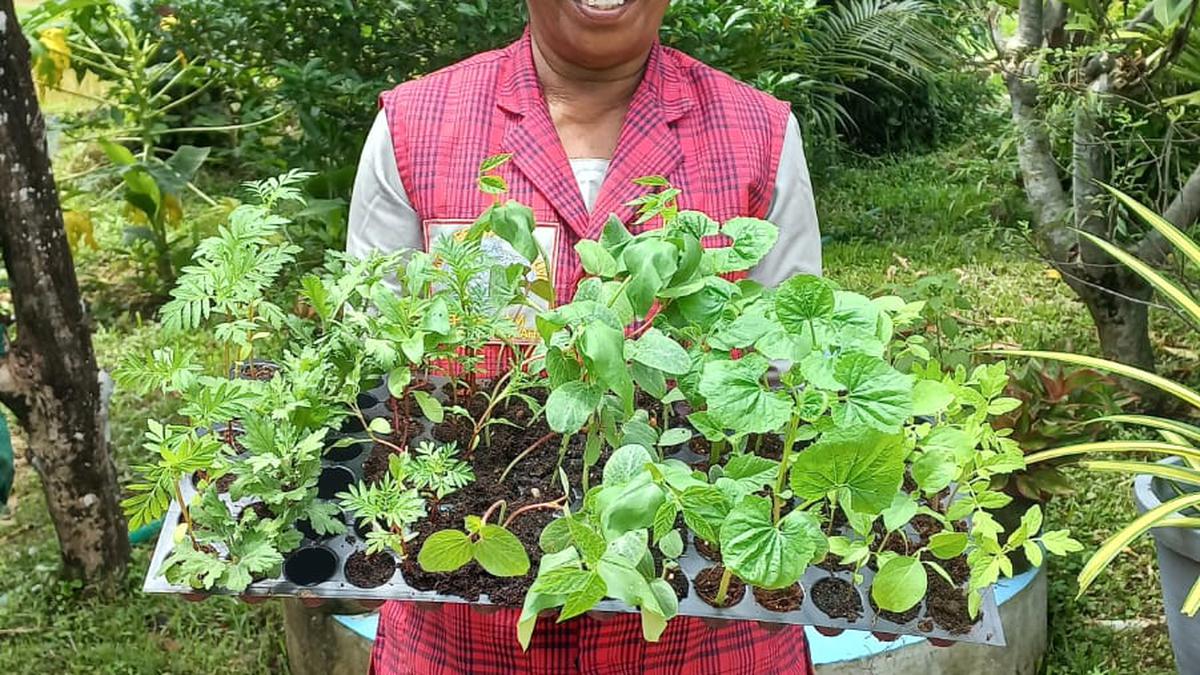
Grow your own Onam lunch with this seed tray from Aluva in Kochi
The Hindu
The State Seed Farm at Aluva in Kochi is readying for the festival of Onam with an assorted seedlings tray, with vegetables and flowers
“Onam is just 60 days away and people can start growing vegetables and flowers to be ready in time for the festival,” says Lisymol J. Vadukkoot, Assistant Director of Agriculture at the State Seed Farm (SSF) in Aluva.
The farm has launched a Thiruvonam assorted seedling tray (priced at ₹300), which has 98 cubicles containing the saplings of vegetables and fruits essential for the festival. On sale at the Eco Shop at the Metro Rail Station Aluva, it contains eight varieties of vegetables (brinjal, bitter gourd, tomatoes, pumpkin, chillies, and lady’s finger) and four to five varieties of flowers (marigold, chrysanthemum, and bachelor’s button). “It required planning to put it together,” says Lisy, adding that “it has received a thumping response.” She advises buyers to sow right away, as the thiruvathira njatuvella (the best time for planting), according to the Malayalam calendar, has just concluded (July 5).
I decide to visit the farm and meet Lisy at an interior road, a few kilometres from Desom Junction. Accessible only by boat, the farm is flanked by the Periyar and its rivulet, the Thoombathode. Spread over 13 acres, the land primarily produces seeds for paddy cultivation. It also houses a rice museum and plots for farm tourism.
A slushy pathway leads to a stream with a raft hitched to a hook on the ground and an archaic ferry system. A rope stretched across the banks and pulled by passengers propels us across. “It is zero-energy travel,” says Lisy, as we disembark on the opposite side where a unique crop of floating paddy grows in bamboo frames on the water.
“Our speciality is that we produce rare and endangered varieties of traditional rice,” says Lisy. These include the rakthashali, rich in antioxidants and supposedly the diet of queens; the golden Njavara rice used mainly for “karkidaka kanji” or the fortified rice gruel popular during the monsoon season; the Jaiva rice that produces almost 800kg of rice from 20kg of seeds; the Japan Violet, a traditional variety from Kasargod, which has unique purple leaves; and others such as Vellathondi, Chettadi and improved Pokkali varieties. Another interesting kind is the Kumol Saul from Majuli island of Assam, “which is prepared by simple soaking in water.”
As the farm also makes value-added products like organic growth promoters, pest repellents, and flowering agents, buyers are encouraged to plant the saplings with a pinch of VAM (Vesicular Arbuscular Mycorrhiza), a biofertilizer used in sustainable agriculture. “We advise them to apply bio slurry once the plant is steady and then a weekly application of in-house made ‘kunjapala’ made with desi cow dung, bone meal, rice husk and coconut cake, and panchagavyam (a mix of desi cow dung, curd, jaggery, tender coconut water and banana), “once the plants flower. It is for high yields,” she explains.
In 2019, the farm had a kit comprising Njavara rice and herbs for the preparation of karikkadam kanji but, due to the failure of the crop due to high winds in the last two seasons, they could not do it this year.





















 Run 3 Space | Play Space Running Game
Run 3 Space | Play Space Running Game Traffic Jam 3D | Online Racing Game
Traffic Jam 3D | Online Racing Game Duck Hunt | Play Old Classic Game
Duck Hunt | Play Old Classic Game











